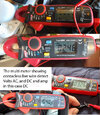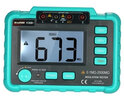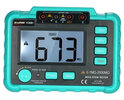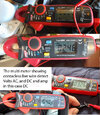We get random, intermittent, occasional faults that cause one of the main breakers on our consumer unit to trip. When it happens, it's not an individual circuit that trips, but instead it's a breaker which controls multiple circuits. Given that none of the individual circuits is tripping, we don't know how to troubleshoot it - nor even how a professional might troubleshoot it.
There appears to be no pattern to when it happens. For example we've had no faults for months - we'd hoped that some rewiring that had been done in one of the bedrooms had cured some problem. However the problem has happened twice in the last 10 days. We might not see the problem again for another few months, but it might happen this evening. We can't see any pattern.
In both most recent occurrences it's happened during the morning (once at about quarter to 8 while wife and daughter were getting ready to leave for school and the most recent time it happened after I'd left for work - it happened some time between about 8:45 and 10:00 when no-one was in the house).

It#s the breaker I'm pointing at in the picture. When it goes, it takes out the hob supply, microwave/combi oven supply, downstairs lights, sockets upstairs, sockets downstairs, and another lot of sockets in the kitchen. Note that we recently moved in (about 2 years ago) and had a new kitchen installed - including all new electrics, with a certificate of major works confirming no problems found. Also note: our house is quite old, and has/had some weird electrics - the kitchen fitters wanted us to have a PME installed (which we did) before they were prepared to start work, though there's still an earth spike. There are multiple sockets circuits - when we were trying to ID them, we used sticky labels (blue dot, blue triangle, blue square, blue rectangle, etc.) to find out which sockets were on which fuse - that's what all the coloured labels are.
In the image above, fuse #6 is for "sockets ground floor + kitchen". If/when the main breaker goes, it takes out the kitchen sockets and boiler. This wouldn't be a disaster, except that the fridge is out. If it happens while we're at work, then no harm done and we won't lose much. Sooner or later it'll happen while we're away, and we'll come home to a fridge full of spoiled food
In the past when this has happened, it has been (but wasn't always) accompanied by a local power cut - this happened at least twice. We thought maybe this is/was being caused by a "micro power surge": is that even a thing, and if so could it cause our consumer unit to trip? And if so, how do we go about proving it in order to get it addressed?
About the best we can imagine for now is to have a professional move the sockets circuit over to the other bank... If the other bank starts tripping out, then maybe we could say that there's some fault on the sockets circuit where the fridge is. Otherwise we'll still have the intermittent fault, but at least if/when it happens again we won't lose power to the fridge!
Any suggestions on how to diagnose/troubleshoot would be very welcome!
There appears to be no pattern to when it happens. For example we've had no faults for months - we'd hoped that some rewiring that had been done in one of the bedrooms had cured some problem. However the problem has happened twice in the last 10 days. We might not see the problem again for another few months, but it might happen this evening. We can't see any pattern.
In both most recent occurrences it's happened during the morning (once at about quarter to 8 while wife and daughter were getting ready to leave for school and the most recent time it happened after I'd left for work - it happened some time between about 8:45 and 10:00 when no-one was in the house).
It#s the breaker I'm pointing at in the picture. When it goes, it takes out the hob supply, microwave/combi oven supply, downstairs lights, sockets upstairs, sockets downstairs, and another lot of sockets in the kitchen. Note that we recently moved in (about 2 years ago) and had a new kitchen installed - including all new electrics, with a certificate of major works confirming no problems found. Also note: our house is quite old, and has/had some weird electrics - the kitchen fitters wanted us to have a PME installed (which we did) before they were prepared to start work, though there's still an earth spike. There are multiple sockets circuits - when we were trying to ID them, we used sticky labels (blue dot, blue triangle, blue square, blue rectangle, etc.) to find out which sockets were on which fuse - that's what all the coloured labels are.
In the image above, fuse #6 is for "sockets ground floor + kitchen". If/when the main breaker goes, it takes out the kitchen sockets and boiler. This wouldn't be a disaster, except that the fridge is out. If it happens while we're at work, then no harm done and we won't lose much. Sooner or later it'll happen while we're away, and we'll come home to a fridge full of spoiled food
In the past when this has happened, it has been (but wasn't always) accompanied by a local power cut - this happened at least twice. We thought maybe this is/was being caused by a "micro power surge": is that even a thing, and if so could it cause our consumer unit to trip? And if so, how do we go about proving it in order to get it addressed?
About the best we can imagine for now is to have a professional move the sockets circuit over to the other bank... If the other bank starts tripping out, then maybe we could say that there's some fault on the sockets circuit where the fridge is. Otherwise we'll still have the intermittent fault, but at least if/when it happens again we won't lose power to the fridge!
Any suggestions on how to diagnose/troubleshoot would be very welcome!







